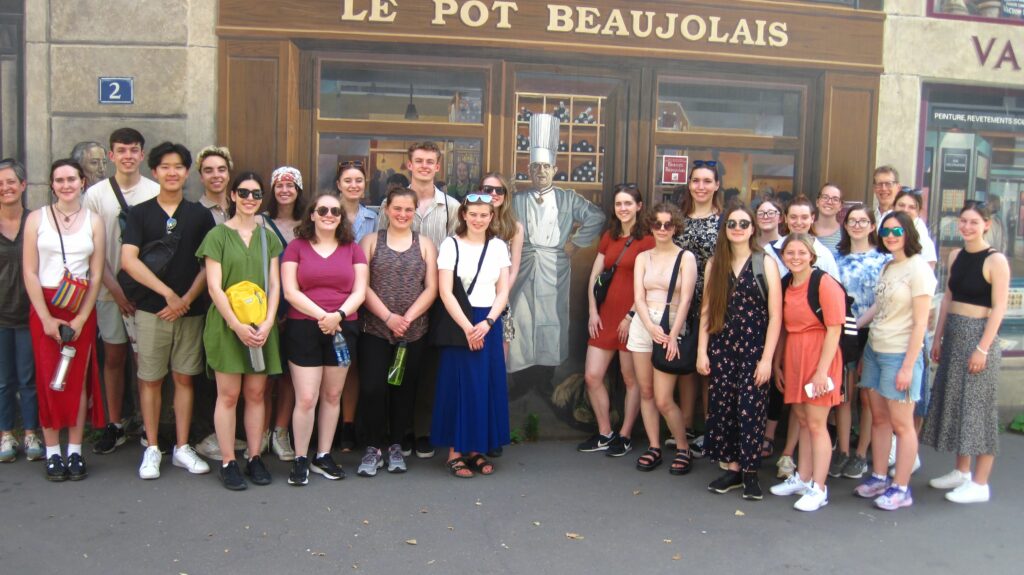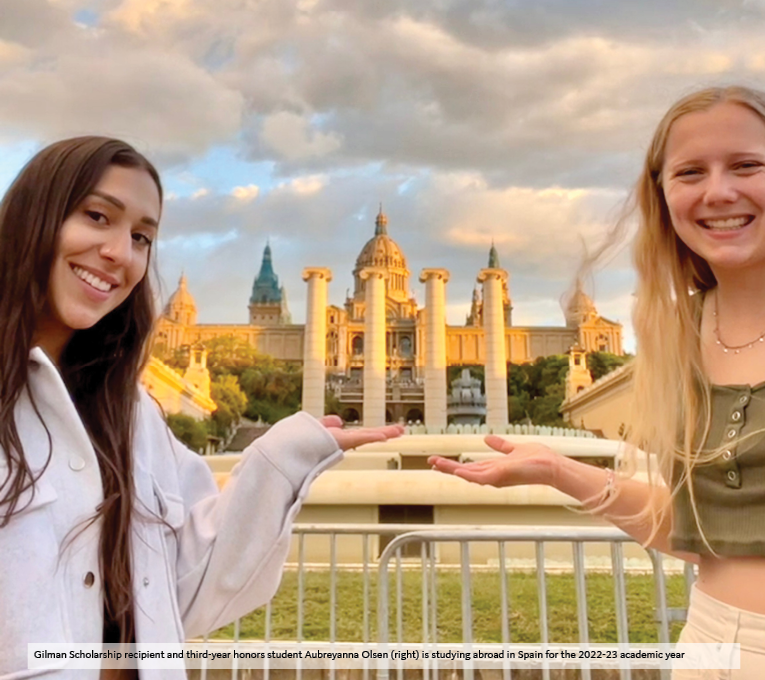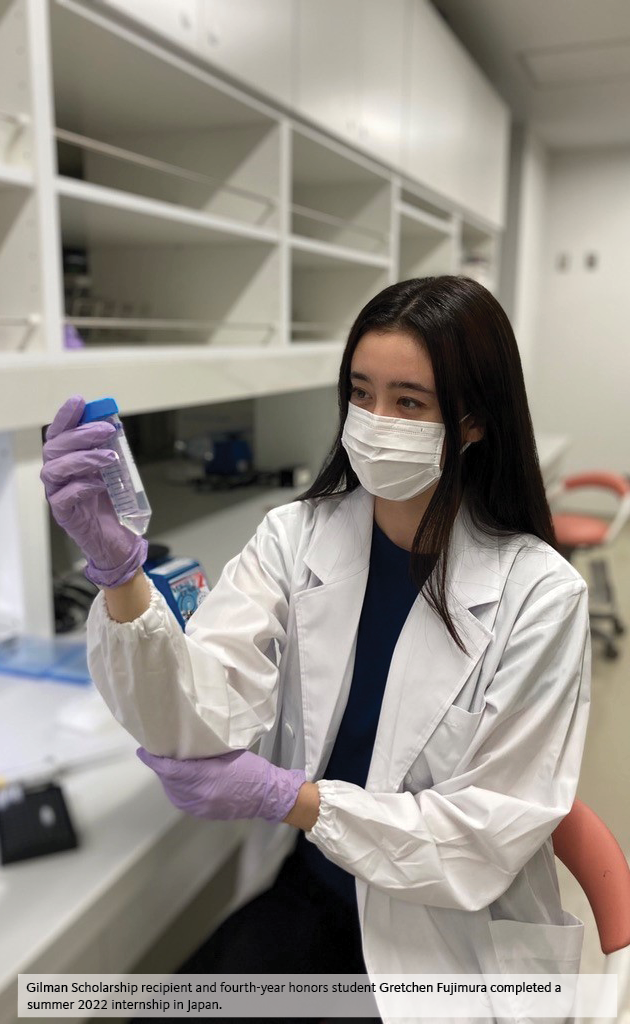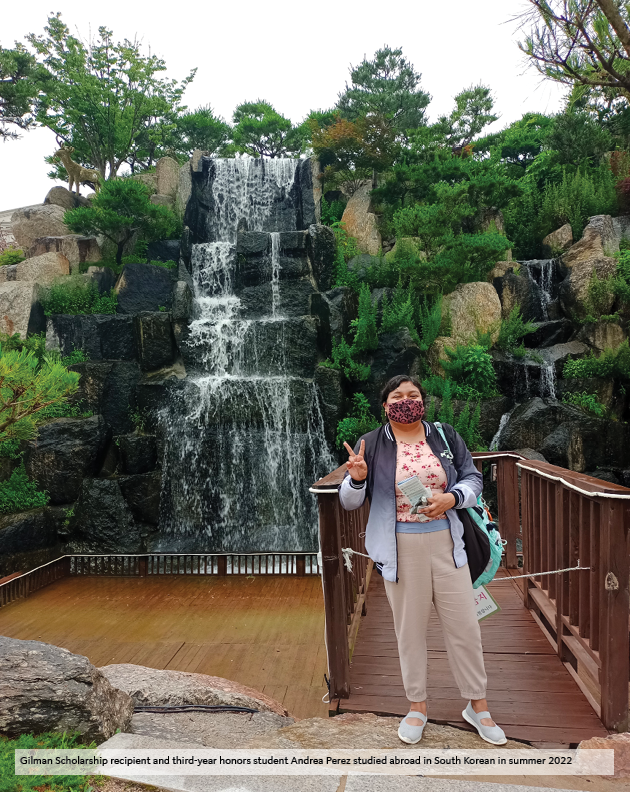The opportunity to study internationally has long been a uniquely rewarding part of many students’ undergraduate experiences, but COVID restrictions have made it one that can also be uniquely difficult to access. With a little luck and a lot of persistence, though, it is still possible.
Oregon State staff and faculty members James Sterns, Dominique Bachelet and LeAnn Adam – along with HC students – have made that clear.
18 Days in France: HC Students Gain New Independence Abroad
The Honors College France study abroad program was one of the many planned opportunities canceled in spring 2020 with the onset of the COVID-19 pandemic. Two years later, faculty leaders James Sterns and Dominique Bachelet made it the first Honors College international program to return, albeit with a whole new set of challenges and experiences.
It was no sure thing, but with students back on campus in the fall of 2021 and COVID-19 vaccinations widely available (and required for OSU students), Sterns and Bachelet got to work arranging travel and lodging logistics with OSU’s partner provider in France and booking hotel reservations and site visits to street markets, historic landmarks, museums and the like. By spring, they had a group of over two dozen students interested in participating.
As with all things post-2020, though, the program was subject to a degree of unpredictability that required increased communication between faculty and students and a level of flexibility that, at times, gave first-time travelers pause. “There was definitely some apprehension, particularly on the front end. The significant majority of students had not traveled internationally before,” says Sterns. The evolving landscape of the pandemic had both faculty leaders more on edge as well. “There’s always an underlying possibility that something happens during study abroad programs. It seemed much more real and much more likely with COVID. ‘Are we really going to do this?’ was a legitimate question.”
At the time, France required proof of a negative COVID test within 48 hours prior to departure from the US, and many places in France required a health pass for those age 16 and over. To obtain that pass, students needed to provide proof that they were fully vaccinated and boosted to a local pharmacy upon arrival.

Despite these hurdles, students and faculty found themselves beginning the experience in France in June 2022 — though flexibility remained essential. “We were worried about the students getting sick, so we wanted them to wear their masks as often as they could, especially in Paris, where the crowds were amazing,” says Bachelet. While students took masking seriously and prioritized personal health, a handful caught the virus en route to Lyon, where the program kicked off. Those who tested positive were isolated in a separate hotel for the mandatory 7-day quarantine and rejoined the group in Paris for the last half of the trip.
COVID introduced other hurdles, too. Speakers in Paris were hesitant to present in person and certain site visits required program participants to split into groups or forgo the visit altogether. The France that Sterns had once been familiar with had undergone a transformation induced by a slowed economy and a workforce that was just beginning to welcome back in-person interactions. “Everybody was a little rusty – the service providers, the restaurants, the tourist industry and us as travelers,” he shares.
Still, expectations were not only met, in some ways they were even exceeded. Where the large group was split up or turned away in particular instances, in others, the thoughtfully-curated itinerary went perfectly to plan. Students took a tour of the world’s largest urban rooftop farm, attended a concert at the Sainte-Chapelle, picnicked at Tuileries Gardens, explored the Martel champagne cave in Reims and day-tripped to the northern French city of Arras.
Students adapted quickly to life in an unfamiliar country. In some ways, the experience of navigating the uncertainties of COVID has prepared them well. “Pretty soon, several of [the students] — at least three or four — could pretty much lead the group,” says Bachelet.
“They quickly realized they could explore on their own. They didn’t need to us to hold their hands.”
Dominique Bachelet
Led by Bachelet, an early morning trip to Montmartre in Paris served as a lesson for students in how to beat the crowds of tourists that characterized the afternoons. It was during this quiet morning, she says, that students got to experience the city as the locals do and to witness the change in atmosphere as out-of-towners began to fill the streets. “They’re in a town with a history and culture — and people who live there full-time — that is affected by tourism.”
Between group outings students were able to rest and explore the country on their own. Initially afraid that many would retreat to the comfort of their rooms during these times, Sterns was thrilled to see how far the majority chose to branch out. One student spent an afternoon taking a solo 15-mile bike ride through the French countryside; one took the train from Lyon for a visit to Disneyland Paris; and four others spent a day in Geneva, making it back on time for dinner. “They became pretty bold,” he says. “It was fun to see how much they really changed from day one to day 18.”

Leading a large group of young travelers through post-lockdown France was a breathtaking experience for the two faculty leaders. “At what point could we exhale? I really felt like I could exhale once it was July 3 and we were back in Corvallis,” Sterns says. Overall, though, it was everything he envisioned — and then some. “Reading some of the feedback we’ve gotten and some of the comments students have made, it’s never been more evident to me that the study abroad program that we did — even if it was only for 18 days — will really alter the trajectory of some of these students’ lives. There are very few things that I can do to have that level of impact.”
“Study abroad is almost singularly the most impactful thing I can do as a university professor.”
James Sterns
Gilman Scholarship Helps Students Chart New Courses Abroad
OSU’s Director of National and Global Scholarships Advising, LeAnn Adam, witnessed the dramatic impact of COVID on students’ international opportunities firsthand. While scholarships continued to be awarded throughout the pandemic, COVID restrictions abroad and widespread uncertainty about travel were enough to deter some applicants throughout 2020 and into 2021, even with updated policies that allowed some funds to be used toward virtual programs.

Designed to provide travel abroad opportunities to historically underrepresented students, the Gilman Scholarship — which is only available to students eligible for a Pell grant — was one of the hardest hit. Recipients receive $3,000 to $5,000 in funding or up to $8,000 if they are studying a critical language. “It’s one of my favorite things to work on,” Adam shares. “It makes such a big difference when students get those funds, no strings attached. Through the pandemic, there weren’t that many applicants to the Gilman scholarship because there just wasn’t much activity in study abroad at all.”
This has all begun to change, though, with international travel now opening up. The gradual easing of COVID restrictions has translated into an uptick in scholarship applications across the board — but the Gilman Scholarship in particular has seen quick growth.
Working closely with OSU Global Opportunities, Adam’s office was diligent in its efforts to reach out to students eligible for the Gilman Scholarship during the 2021-2022 academic year, making them aware of not only the program itself, but of the support available from National and Global Scholarships Advising in preparing an application.
“Our office is there to support them. We’re here, and we’re helpful.”
“It’s not scary — it’s a prestigious scholarship, but it’s super accessible. Its whole intent is to help turn the tide for students who have been historically underrepresented in education abroad. That applies to race and ethnicity, but that also applies to diversity in where students go abroad and the academic disciplines they represent,” she says.
Committed to keeping its policies malleable, the program pivoted often as restrictions came and went, green-lighting travel to countries that were not considered unsafe aside from the presence of COVID and making exceptions to how and when students were able to use their awards. “Gilman recipients were even allowed to use their scholarships after they graduated, which they’ve never done before. They were really, really flexible in allowing students to do what made sense for them and still be able to use their funding.”

Uncertainty was enduring, though, and it wasn’t until the spring of 2022 that interest took a sharp turn. “In the last cycle [in 2021], we had one person apply,” Adam shares. In March of 2022, her office saw that number jump to 23.
Of those 23 applicants, a record-breaking 21 were awarded the scholarship to use toward a study abroad program or internship of their choice, representing all nine undergraduate colleges at the university and $80,500 in funding for OSU students with high financial need. “Twenty-three [applicants] was way beyond my expectations,” says Adam. And with a success rate that, in the past, has consistently hovered around 40%, “getting 21 recipients blew us all out of the water.”

While the 2022 application cycle has been markedly different from the year prior, COVID-related obstacles still linger. Host countries and programs have been fickle, forcing students to navigate cancelations, switch or delay programs or, in one case, choose to decline the award altogether. For those who have steadily pursued their goal to take their education abroad, though, LeAnn holds not only admiration, but an optimism for how they will thrive in their respective programs and future travels. “It requires a lot of flexibility and persistence. But I think those are great qualities for students to have for a successful experience abroad. You have to constantly adjust.”
By: Adriana Fischer, Media and Communications Representative
CATEGORIES: All Stories Experience Homestories